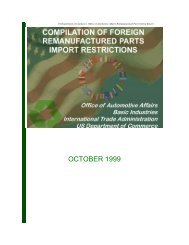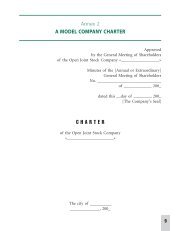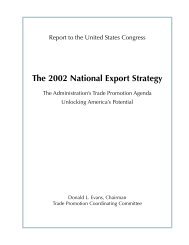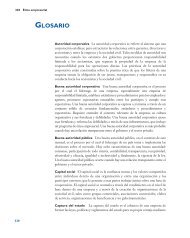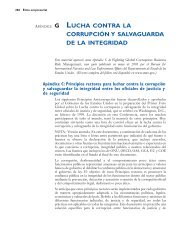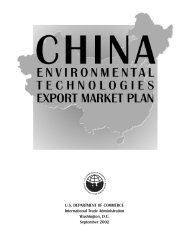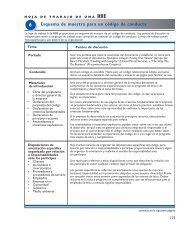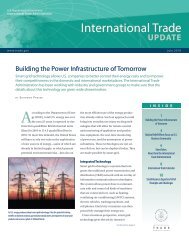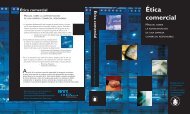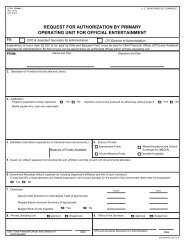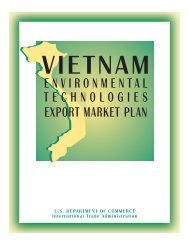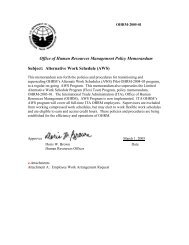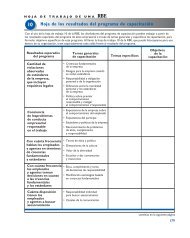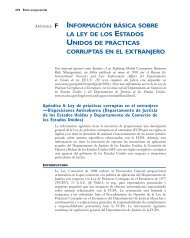Global Steel Trade; Structural Problems and Future Solutions
Global Steel Trade; Structural Problems and Future Solutions
Global Steel Trade; Structural Problems and Future Solutions
Create successful ePaper yourself
Turn your PDF publications into a flip-book with our unique Google optimized e-Paper software.
U.S. Firm Takes Over Hanbo <strong>Steel</strong><br />
Protracted negotiations for the purchase of Hanbo <strong>Steel</strong> concluded in March 2000 when the Nabors<br />
Consortium (a U.S.-based investment firm) signed a purchase agreement to pay approximately $500<br />
million in cash for the insolvent mill. Once the final sale is concluded, Nabors is expected to liquidate<br />
Hanbo <strong>and</strong> establish a new company to take over Hanbo’s assets <strong>and</strong> employees. The new company<br />
would be free from Hanbo’s debts, while Hanbo’s creditors (many government-controlled) <strong>and</strong> public<br />
funds will absorb the reportedly significant balance of the debt not recovered by Hanbo’s sale.<br />
Nabors plans to diversify its new steel production from Hanbo’s current production <strong>and</strong> to collaborate<br />
with U.S. <strong>Steel</strong> <strong>and</strong> Hylsa of Mexico in rehabilitating the ailing steel producer. Current plans for the<br />
new company include:<br />
• Restarting the hot-rolled carbon steel coil mill (capacity: 1.8 million MT) as soon as the final sale is<br />
concluded.<br />
• Completing a cold-rolled carbon steel mill (capacity: 2 million MT of crude steel).<br />
• Completing the Corex mill (capacity: 2.5 million MT of hot-rolled carbon steel coil) within the next<br />
few years.<br />
• In May 2000, Inchon Iron & <strong>Steel</strong> (Inchon <strong>Steel</strong>), now a subsidiary of the Hyundai Group, announced<br />
that it would acquire Sammi <strong>Steel</strong>. If the acquisition is approved by the Korea Fair <strong>Trade</strong> Commission<br />
(KFTC), the new company will surpass POSCO as Korea’s largest stainless steel producer, holding 43<br />
percent of the market, while POSCO will hold only 31 percent of the market. 65<br />
• Industry experts expect the Hyundai Group to further merge Hyundai Pipe into the new Inchon <strong>Steel</strong>. 66<br />
The Hyundai Group plans to spin off the merged steel firm later this year.<br />
• Acquisitions across borders have also taken place. A Japanese investment company purchased a 41<br />
percent equity interest in Hyundai Pipe, making it the largest shareholder. 67 These industry<br />
developments could lead to the emergence of a steel giant out of the former Inchon <strong>Steel</strong>, Sammi <strong>Steel</strong>,<br />
Kangwon Industries, <strong>and</strong> Hyundai Pipe.<br />
Restructuring of the Korean steel industry holds great promise for eliminating or rationalizing uneconomic<br />
capacity. Some individual firms have committed to reducing capacity. However, restructuring efforts by the<br />
industry in general have been slow in spite of continued low capacity utilization rates in 1999. The<br />
government has not announced specific actions it will take to implement the restructuring guidelines <strong>and</strong><br />
address this problem. Again, the future of the Korean steel industry depends largely on the will of industry<br />
<strong>and</strong> the government to sustain momentum for change.<br />
POSCO’s Monopolistic Position in the Domestic Market<br />
Before competition can truly take hold in the Korean steel sector, the Korean government must follow<br />
through with its privatization of POSCO. As Korea’s—<strong>and</strong> the world’s—largest steel company, POSCO<br />
has a monopolistic position in the Korean market for certain major steel products <strong>and</strong> maintains its power<br />
over the distribution sector. As part of the Korean government’s privatization program, <strong>and</strong> at the urging of<br />
the U.S. government to fully privatize POSCO, a portion of POSCO’s shares held by the governmentowned<br />
Korean Development Bank (KDB) were sold in July 1999. During that offering, KDB’s ownership<br />
position was reduced from 21 percent to 13 percent. At that time, the Korean government stated<br />
emphatically that the rest of the shares held by KDB would be sold by the end of 1999.<br />
Even though KDB offered 12 percent of POSCO shares in December 1999, the sale was called off due to<br />
differences in bid prices for the shares <strong>and</strong> the price that the government wanted to obtain for the shares. 68<br />
However, immediately after the failed December bidding, KDB sold 3 percent of those shares to POSCO,<br />
Chapter 5: Reforms <strong>and</strong> Restructuring Abroad 131



